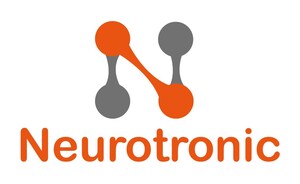
Groundbreaking results from two NECTAR trials were presented at TCT 2025
SAN FRANCISCO, Oct. 27, 2025 /PRNewswire/ -- Neurotronic, Inc., a developer of multi-organ denervation to treat complex cardiovascular and metabolic disease, announced today that the first clinical outcomes of Neuviant™ Multi‑organ Denervation (MDN – hepatic and renal denervation) in patients with both type 2 diabetes mellitus (T2DM) and hypertension (HTN), two of the most prevalent and difficult‑to‑treat, chronic diseases worldwide, were presented at Transcatheter Cardiovascular Therapeutics (TCT) 2025. These were the first reported outcomes of this innovative investigational therapy targeting multiple overactive sympathetic pathways ("fight or flight" nervous system).
The data came from the NECTAR III and NECTAR IV (Neurotronic Ablation of Arteries for the Treatment of Type 2 Diabetes Mellitus and Its Comorbidities) single-arm clinical studies, which evaluated Neurotronic's investigational Neuviant™ Multi‑organ Denervation (MDN) System. Both studies assessed the safety, performance, and efficacy of common hepatic and bilateral (left and right) renal denervation in patients with T2DM and HTN. NECTAR III enrolled patients who were diagnosed with both diseases and had either condition, or both, uncontrolled despite medications, and NECTAR IV required patients to have both diseases uncontrolled.
Results were presented in two oral sessions at the annual TCT conference held this year in San Francisco, CA. Professor Dr.Horst Sievert presented the results of NECTAR IV in the Best Endovascular Intervention Abstracts session on Sunday, October 26, and Dr.Ajay J. Kirtane presented the results of NECTAR III in the Innovation Session on Percutaneous Denervation for the Treatment of Chronic Diseases on Monday, October 27. Together, these presentations marked the first time clinical outcomes associated with multi‑organ denervation have been reported to the global cardiovascular community.
The investigational Neuviant MDN procedure involves ethanol delivered by catheter into the tissue surrounding the hepatic (liver) and renal (kidney) arteries. The therapy is designed to target overactive sympathetic nerve pathways with the aim of disrupting their function to reduce both high blood sugar and high blood pressure. "Neuviant multi-organ denervation is a straightforward procedure that is well-tolerated by patients," said Professor Sievert, who supported all procedures in the NECTAR IV study.
They highlighted the following key study outcomes in their presentations:
NECTAR III – Dr. Ajay J. Kirtane, MD, Columbia University Medical Center
- The 30-day procedural safety endpoint – defined as 30-day freedom from serious device or procedure-related complications (death, flow-limiting dissection, type 3 perforation, bleeding requiring transfusion, thrombo-embolization, clinically significant liver/renal dysfunction) – was met in 97.4% (37/38) of patients. The one safety event was a complication in a renal accessory artery associated with placement of a guide catheter and resolved with percutaneous dilation and stenting.
- Therapy effectiveness through 6 months follow-up was demonstrated through a reduction in HbA1c and 24-hour systolic ambulatory blood pressure measurements (sABPM):
- Average HbA1c was reduced by -0.69% at 3M, and -0.53% at 6M, with 58% of patients improving by at least 0.5% at 3 months (3M) and 54% at 6 months (6M)
- Average sABPM was reduced by -6.6mmHg at 3M and -5.5mmHg at 6M, with 58% of patients improving by at least 5mmHg at 3M, and 54% at 6M
- The results from the NECTAR III study demonstrated the feasibility of multi-organ denervation as a treatment for T2DM and HTN
NECTAR IV – Professor Horst Sievert, MD – CardioVascular Center Frankfurt
- 85% (33/39) of patients received full treatment (multi-organ – hepatic and bilateral renal denervation).
- The primary procedural safety endpoint – defined as in NECTAR III – was met in 100% (39/39) of patients.
- Therapy effectiveness through 6 months follow-up was demonstrated through a reduction in HbA1c and 24-hour systolic ambulatory blood pressure measurements (sABPM):
- Average HbA1c was reduced by -1.03% at 3M, and -0.98% at 6M, with 78% of patients improving by at least 0.5% at 3M and 74% at 6M
- Average sABPM was reduced by -14.0mmHg at 3M and -14.4mmHg at 6M, with 72% of patients improving by at least 5mmHg at 3M, and 71% at 6M. Most patients experienced even more significant improvement, with 64% of patients improving by at least 10mmHg at 3M, and 62% at 6M
- In this population of patients with both diseases uncontrolled, Neuviant MDN was associated with excellent procedural safety and significant improvement in both blood glucose and blood pressure.
"Type 2 diabetes and hypertension are two of the most direct causes of cardiovascular events and sadly remain poorly controlled in many patients. These early results of multi-organ denervation set the stage for the next phase of clinical trials investigating this technology," said Columbia University Medical Center's Dr. Ajay J. Kirtane, who will serve as a National Principal Investigator for Neurotronic's U.S. pilot randomized controlled trial (RCT) scheduled to begin in 2026.
"We are proud to be at the forefront of the emerging field of multi‑organ denervation in collaboration with world experts," said Lixiao Wang, PhD, CEO of Neurotronic, Inc. "Our goal in advancing this novel therapy is to address a large and growing unmet need in patients with cardiometabolic disease, including type 2 diabetes and hypertension."
About the Neuviant™ Multi‑Organ Denervation (MDN) System
Neurotronic's Neuviant MDNSystem uses the Neuviant MDN Catheter to deliver dehydrated ethanol (Simpathol™) with the goal of achieving neurolysis of overactive sympathetic nerves as a treatment for T2DM and HTN. The system is investigational and limited to use in clinical trials.
About Neurotronic, Inc.
Founded in 2015, Neurotronic is pioneering multi‑organ denervation to treat complex cardiovascular and metabolic disease, including comorbid type 2 diabetes and hypertension. Clinicians interested in learning more about Neuviant MDN therapy and future clinical trials may email [email protected] or visit our website, https://www.neurotronic.com
SOURCE Neurotronic







Share this article